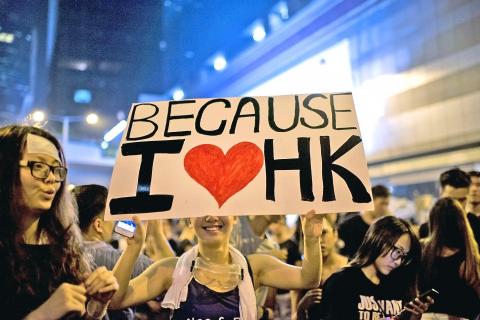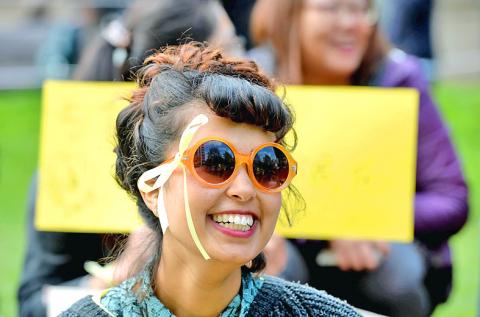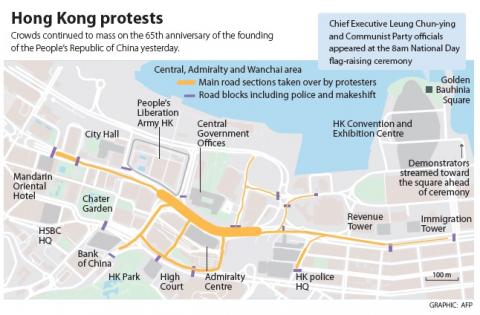Thousands of pro-democracy protesters thronged the streets of Hong Kong yesterday, some of them jeering China’s National Day celebrations, while students threatened to ramp up demonstrations if the territory’s pro-Beijing leader did not step down.
There was little sign of momentum flagging on the fifth day of the “Occupy Central” protest, whose aim has been to occupy sections of the territory, including around the Central financial district, in anger at a Chinese decision to limit voters’ choices in a 2017 leadership election.
Many had feared police would use force to move crowds before yesterday’s celebrations marking the anniversary of the foundation of the People’s Republic of China in 1949. Those fears proved unfounded and police stayed in the background.

Photo: AFP
The crowds have brought large sections of the Asian financial hub to a standstill, disrupting businesses from banks to jewelers. There were no reports of trouble yesterday, but witnesses said the number of protesters swelled in the evening.
Student leader Lester Shum (岑敖暉) issued an ultimatum to Hong Kong Chief Executive Leung Chun-ying (梁振英): Step down or else face wider protests.
“We will escalate the action if C.Y. Leung doesn’t resign by tonight or tomorrow night. We will occupy more government facilities and offices,” Shum told reporters, without elaborating. “I believe the government is trying to buy more time. They want to use tactics, such as sending some people to create chaos, so that they would have a good reason to disperse the crowd.”

Photo: AFP
Riot police had used tear gas, pepper spray and baton charges at the weekend to try to quell the unrest, but tensions have eased since then as both sides appeared ready to wait it out, at least for now.
The protests are the biggest in Hong Kong since China resumed its rule of the former British colony in 1997. They pose one of the biggest political challenges for Beijing since it violently crushed pro-democracy protests in Tiananmen Square in 1989.
A government source with ties to the chief executive said Leung and his advisers planned to soften their approach.

“It may take a week or a month, we don’t know. Unless there’s some chaotic situation, we won’t send in riot police... we hope this doesn’t happen,” the source said.
China has dismissed the protests as illegal, but in a worrying sign for the Chinese Communist Party leadership in Beijing, the pro-democracy protests have spread to neighboring Macau.
Yesterday, the Hong Kong demonstrations moved into Tsim Sha Tsui, a shopping area popular with mainland Chinese visitors. It would normally be doing roaring trade during the National Day holiday.
Underlining nervousness among some activists that provocation on National Day could spark violence, protest leaders urged crowds not to disturb the flag-raising ceremony on the Victoria Harbour waterfront.
The event went ahead peacefully, although scores of students who ringed the ceremony at Bauhinia Square booed as the national anthem was played.
A beaming Leung shook hands with supporters waving the Chinese flag, even as protesters who want him to stand down chanted: “We want real democracy.”
“We hope that all sectors of the community will work with the government in a peaceful, lawful, rational and pragmatic manner... and make a big step forward in our constitutional development,” Leung said in a speech.
Rights groups said that a number of mainland Chinese activists supporting the protests had been detained or intimidated by police.
Mainland Chinese visiting Hong Kong had differing views on the demonstrations.
“For the first time in my life, I feel close to politics,” said a tourist from Beijing surnamed Yu. “I believe something like this will happen in China one day.”
However, a woman surnamed Lin, from the southern Chinese city of Shenzhen, said the protesters’ demands for a democratic election were “disrespectful to the mainland.”
“Even though the government has brought a lot of development to Hong Kong, they don’t acknowledge this,” Lin said.

INVESTIGATION: The case is the latest instance of a DPP figure being implicated in an espionage network accused of allegedly leaking information to Chinese intelligence Democratic Progressive Party (DPP) member Ho Jen-chieh (何仁傑) was detained and held incommunicado yesterday on suspicion of spying for China during his tenure as assistant to then-minister of foreign affairs Joseph Wu (吳釗燮). The Taipei District Prosecutors’ Office said Ho was implicated during its investigation into alleged spying activities by former Presidential Office consultant Wu Shang-yu (吳尚雨). Prosecutors said there is reason to believe Ho breached the National Security Act (國家安全法) by leaking classified Ministry of Foreign Affairs information to Chinese intelligence. Following interrogation, prosecutors petitioned the Taipei District Court to detain Ho, citing concerns over potential collusion or tampering of evidence. The

‘FORM OF PROTEST’: The German Institute Taipei said it was ‘shocked’ to see Nazi symbolism used in connection with political aims as it condemned the incident Sung Chien-liang (宋建樑), who led efforts to recall Democratic Progressive Party (DPP) Legislator Lee Kun-cheng (李坤城), was released on bail of NT$80,000 yesterday amid an outcry over a Nazi armband he wore to questioning the night before. Sung arrived at the New Taipei City District Prosecutors’ Office for questioning in a recall petition forgery case on Tuesday night wearing a red armband bearing a swastika, carrying a copy of Adolf Hitler’s Mein Kampf and giving a Nazi salute. Sung left the building at 1:15am without the armband and apparently covering the book with a coat. This is a serious international scandal and Chinese

Seventy percent of middle and elementary schools now conduct English classes entirely in English, the Ministry of Education said, as it encourages schools nationwide to adopt this practice Minister of Education (MOE) Cheng Ying-yao (鄭英耀) is scheduled to present a report on the government’s bilingual education policy to the Legislative Yuan’s Education and Culture Committee today. The report would outline strategies aimed at expanding access to education, reducing regional disparities and improving talent cultivation. Implementation of bilingual education policies has varied across local governments, occasionally drawing public criticism. For example, some schools have required teachers of non-English subjects to pass English proficiency

TRADE: The premier pledged safeguards on ‘Made in Taiwan’ labeling, anti-dumping measures and stricter export controls to strengthen its position in trade talks Products labeled “made in Taiwan” must be genuinely made in Taiwan, Premier Cho Jung-tai (卓榮泰) said yesterday, vowing to enforce strict safeguards against “origin laundering” and initiate anti-dumping investigations to prevent China dumping its products in Taiwan. Cho made the remarks in a discussion session with representatives from industries in Kaohsiung. In response to the US government’s recent announcement of “reciprocal” tariffs on its trading partners, President William Lai (賴清德) and Cho last week began a series of consultations with industry leaders nationwide to gather feedback and address concerns. Taiwanese and US officials held a videoconference on Friday evening to discuss the